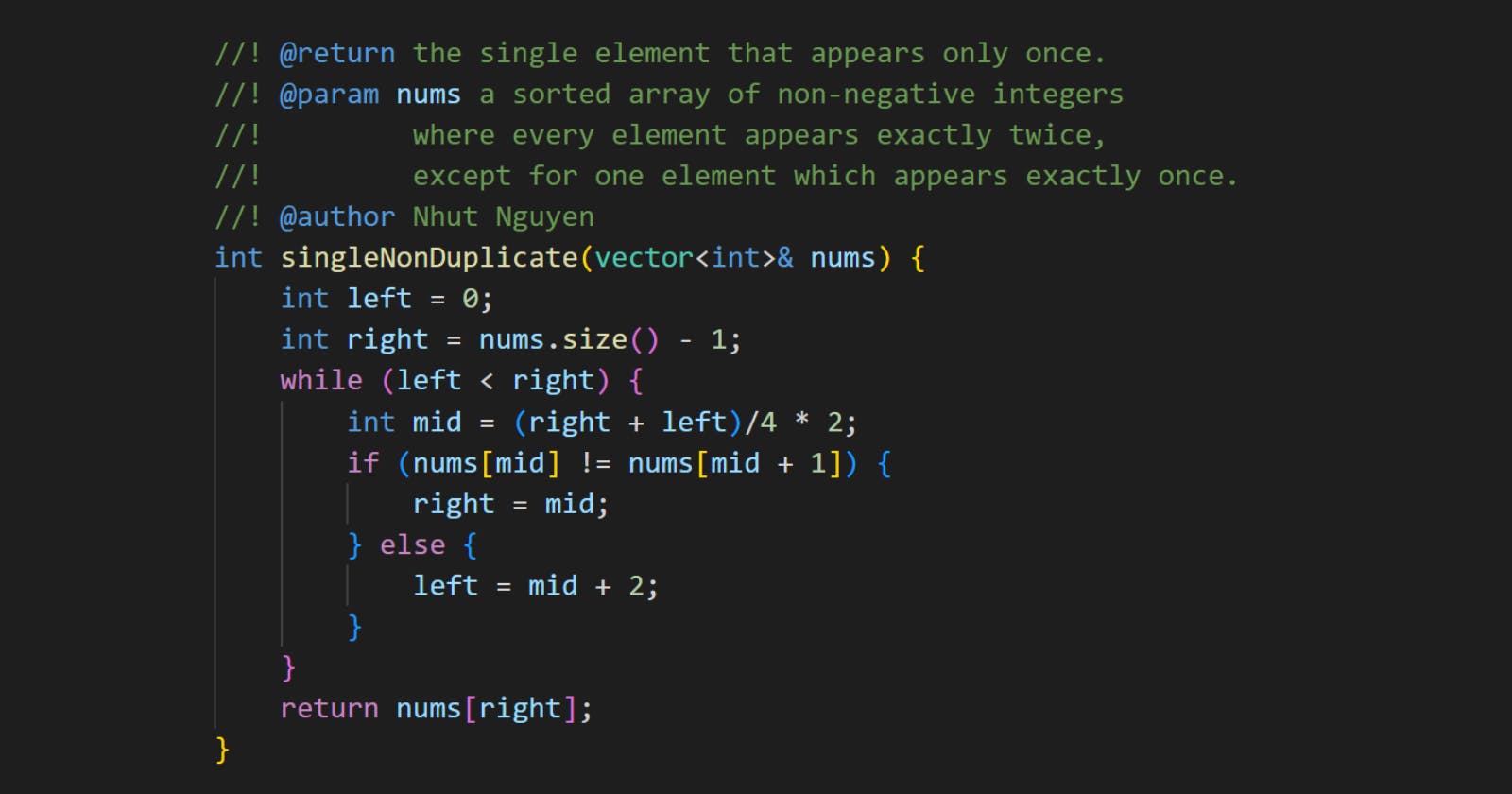540. Single Element in a Sorted Array
An example of using the binary search algorithm
Problem statement
You are given a sorted array consisting of only integers where every element appears exactly twice, except for one element which appears exactly once.
Return the single element that appears only once.
Your solution must run in O(log n) time and O(1) space.
Example 1
Input: nums = [1,1,2,3,3,4,4,8,8]
Output: 2
Example 2
Input: nums = [3,3,7,7,10,11,11]
Output: 10
Constraints
1 <= nums.length <= 10^5.0 <= nums[i] <= 10^5.
Solution 1: Bruteforce
Code
#include <vector>
#include <iostream>
using namespace std;
int singleNonDuplicate(vector<int>& nums) {
for (int i = 0; i < nums.size() - 1; i += 2) {
if (nums[i] != nums[i + 1]) {
return nums[i];
}
}
return nums[0];
}
int main() {
vector<int> nums{1,1,2,3,3,4,4,8,8};
cout << singleNonDuplicate(nums) << endl;
nums = {3,3,7,7,10,11,11};
cout << singleNonDuplicate(nums) << endl;
nums = {3};
cout << singleNonDuplicate(nums) << endl;
}
Output:
2
10
3
Complexity
Runtime
O(n/2), wheren = nums.length.Memory
O(1).
Solution 2: Binary search
Since nums is sorted, you can perform a binary search on it.
Let us divide nums into two halves.
If the single element belongs to the right half, all elements of the left half satisfy nums[2*i] == nums[2*i + 1].
Conversely, if the single element belongs to the left half, that condition is violated at the middle element of nums (the middle one with an even index).
Example 1
For nums = [1,1,2,3,3,4,4,8,8]:
The middle element with even index is
nums[4] = 3. It is not equal tonums[4 + 1] = 4. So the single element must be somewhere in the left half[1,1,2,3,3].The middle element of
nums = [1,1,2,3,3]with even index isnums[2] = 2, which is not equal tonums[2 + 1] = 3. So the single element must be somewhere in the left half[1,1,2].The middle element of
nums = [1,1,2]with even index isnums[0] = 1 == nums[0 + 1]. So the single element must be somewhere in the right half[2].nums = [2]contains only one element. So2is the result.
Code
#include <vector>
#include <iostream>
using namespace std;
int singleNonDuplicate(vector<int>& nums) {
int left = 0;
int right = nums.size() - 1;
while (left < right) {
int mid = (right + left)/4 * 2; // to make sure mid is even
if (nums[mid] != nums[mid + 1]) {
right = mid;
} else {
left = mid + 2;
}
}
return nums[right];
}
int main() {
vector<int> nums{1,1,2,3,3,4,4,8,8};
cout << singleNonDuplicate(nums) << endl;
nums = {3,3,7,7,10,11,11};
cout << singleNonDuplicate(nums) << endl;
nums = {3};
cout << singleNonDuplicate(nums) << endl;
}
Output:
2
10
3
Complexity
Runtime
O(logn), wheren = nums.length.Memory
O(1).
Reference
Thanks for reading. Feel free to share your thought about my content and check out my FREE book “10 Classic Coding Challenges”.

